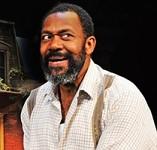Fences - Review
This is a revival of August Wilson's 1987 play which won a Pulitzer Prize for Drama in the same year. In the leading role here is Lenny Henry, better known to most of us in the UK as a comedian but increasingly making a name for himself as what is often oddly described as a 'straight actor'. Though Mr Henry proves more than capable of coping with this immensely challenging role, he is extremely well-served by a very fine cast, and together they produce an intense and thought-provoking drama.
'Fences' is set in 1957 in the Hill district of Pittsburgh, Pennsylvania. It is concerned with a man called Troy (Lenny Henry), a fifty-three year old refuse collector who lives with his 17 year old son, Cory, and his wife, Rose, in a house which looks like it is about to be possessed by an old tree which is stretching its green tentacles over the roof from the backyard where all the action takes place. Troy is building a fence round the house. The fence could be intended to keep things in or out - it never really becomes totally clear which purpose it is meant to serve. During the course of the play, we are drip-fed details about Troy's life. Aged fourteen he left home after being beaten by his father and subsequently had to resort to robbery in order to survive. That led to him being sent to prison for 15 years when he unintentionally killed a victim. Later in his life, he was a formidable baseball player whose dreams were supposedly dashed by the white-dominated structure of the sport, though there is also the suggestion that he might have simply been too old. Now, Troy is settled and has the appearance of respectability. He is hard-working and takes his family responsibilities seriously, even if he finds them onerous and seeks solace elsewhere.
Mr Henry's Troy is, in many ways, a likeable character. He tells yarns and tall stories and has a natural and ready sense of humour, especially on a Friday night when he has cashed his pay-cheque and has spare money for a bottle of gin to share with his long-time friend and fellow trash-thrower, Bono (excellently defined by Colin McFarlane). But, as we learn more about his life and his motivations, he becomes much less likeable, more brutal and rather savage, especially in his treatment of his younger son, Cory. Troy is able to tell his friend Bono that he 'loves him', but seems unable or unwilling to do likewise for his son, who lives in fear of his father and even asks at one juncture why his father doesn't like him. It's the saddest part of a sad story, and it leaves us feeling rather antagonistic towards Troy, even if we can understand that his motivations and actions are influenced by his upbringing and environment.
Paulette Randall's meticulously-directed production is totally absorbing throughout. Finely-tuned performances and sometimes intense and powerful emotions are on display almost in 3D. Mr Henry certainly shows that he is mastering the acting business in a performance which is a little short of being truly outstanding (as in the 'once in a lifetime' kind of performance), but it is certainly powerfully captivating, and more than sufficient to convince that he has made the transition from comedian to a fine actor. I noticed just a couple of fleeting moments when Mr Henry's comedian self seemed to bubble to the surface, but if I had blinked I would have missed them. In every other way, Mr Henry's performance is authentic, convincing and completely honest. But he does have the big advantage of a great cast on his side. Tanya Moodie provides immensely moving and poignant support as the betrayed wife, Rose. And I also enjoyed Ashley Zhangaha's excellent Cory, a young man terrified of his father and bewildered by his parent's attitude towards him.
(Peter Brown)
"Beautifully judged and bruisingly powerful revival."
Paul Taylor for The Independent
"Fences is dense and unsettling..It is worth seeing for [Lenny] Henry's immense performance, which switches compellingly from humour to fury and from hopefulness to piercing disillusionment."
Henry Hitchings for The Evening Standard
"Randall's beautifully paced direction...The cast is uniformly excellent...What a pleasure to see the transformation of a somewhat ill-at-ease comedian [Lenny Henry] into the epic tragedian he was, clearly, always meant to be. "
Jane Shilling for The Daily Telegraph
"[Lenny] Henry confirms he is an actor of massive presence and emotional power...Paulette Randall's finely calibrated production."
Michael Billington for The Guardian
Originally published on
